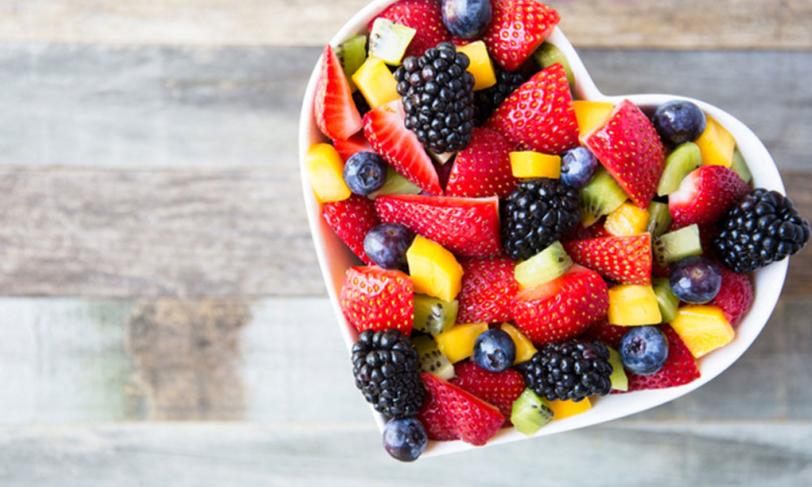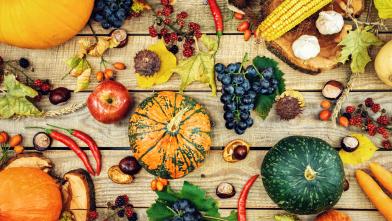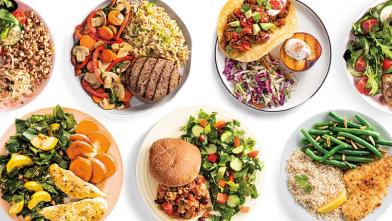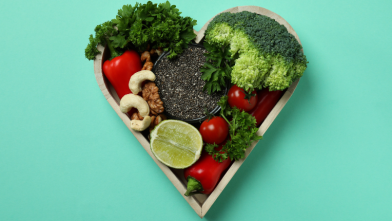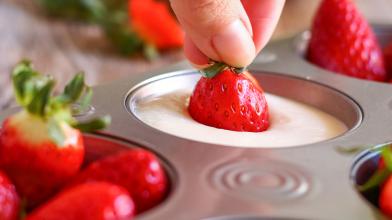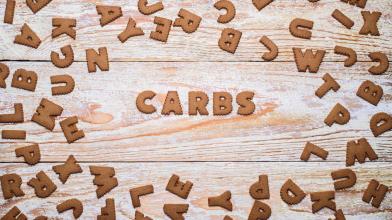
Before you give up all fruit, let’s consider the many health benefits—fruit is loaded with vitamins, minerals, and antioxidants, just like vegetables. The bright and varied colors of fruit each come with different vitamins and minerals.
Fruit is also a source of water and fiber that can help you stay hydrated, feel full, and maintain regular bowel movements. It can be tough to get enough fiber in your day, but doing so can also help with managing blood glucose and reducing your risk of heart disease.
Given the health benefits, there is no need to cut fruit out of your diet. Fruit contains natural sugars while other sweet treats are often filled with added sugars.
As a matter of fact, fruit can be a great option in place of desserts and pastries when you are craving something sweet. A bowl of Berries and Cream after dinner can be just as satisfying as a bowl of ice cream!
Fruit can also be a portable snack when you’re on the go, and is often much more nutritious (and lower in carbs) than most snack foods. Make a colorful and fun snack with Fruit and Cheese Kabobs.
Portion size is key

Like many carbohydrate foods, portion sizes of fruit have grown larger over the years. While fruit is lower in carbohydrate than many other foods, it’s important to be aware of your portion size.
Each of the following examples of fruit portions have about 15 grams of carbohydrate. This should help you decide how to fit fruit into your meal plan:
- A small piece of fruit such as an apple, plum, orange, kiwi, peach, etc. By small we mean something about the size of a tennis ball.
- 1 cup berries or chopped fruit like melon
- 12-15 cherries or grapes
- 1/2 of a banana
- 1/2 cup (4 oz) of 100% fruit juice
- 1/2 cup (4 oz) of applesauce or other whole fruit puree or smoothie (look for no sugar added!)
What's the best way to eat fruit?
Fruit comes in many forms - fresh, frozen, canned, dried, juice, etc. All can be good choices depending on the season, your budget, and what you're using it for.
- For fresh fruit, choose things that are in season and locally grown - these will have the best flavor and will often be on sale.
- Frozen fruits are usually cheaper than fresh fruits, especially off season. They are picked and frozen when they are ripest, making them just as nutritious as fresh fruit.
- Canned fruits keep longer in your pantry than fresh or frozen fruit and are a great choice on a budget. Be sure to choose canned fruit packed in water or 100% juice with no sugar added.
- Dried fruits can be a tasty addition to a trail mix or sprinkled on a salad, but the portions are much smaller than expected! Just 2 (level) tablespoons of dried fruit, like raisins or dried cranberries, contains about 15 gram sof carbohydrate. Look for dried fruits with minimal added sugar and be sure to measure your portion.
- Whole fruits are generally a better choice over juice. Juice doesn't have the beneficial fiber found in whole fruit, but can be a great option for treating hypoglycemia (low blood sugar). If you choose fruit juice, aim for 1/2 cup or 4 ounce servings and make sure that it is 100% fruit juice with no added sugar (check the ingredients!).
- Processed fruits like jellies and jams are typically made with lots of added sugar. Treat these more like a sugary condiment (like maple syrup) in your meal plan and use sparingly.
Check out 10 Low-Carb Fruit Recipes for more fruit inspiration!
BOTTOM LINE:
If you enjoy eating fruit, there is no need to stop eating it if you have diabetes. And if you have a sweet tooth, fruit is a better option than pastries and other deserts to satisfy a sugar craving.
Since fruit does contain carbohydrate, it’s important to be aware of your portion size and how it fits into your daily meal plan. However, fruit is loaded with vitamins, minerals, antioxidants, and fiber, which have many health benefits—and it tastes good too!
